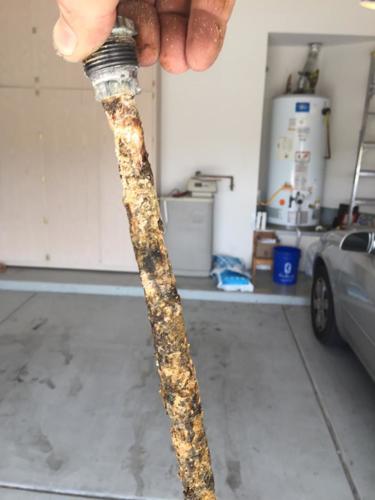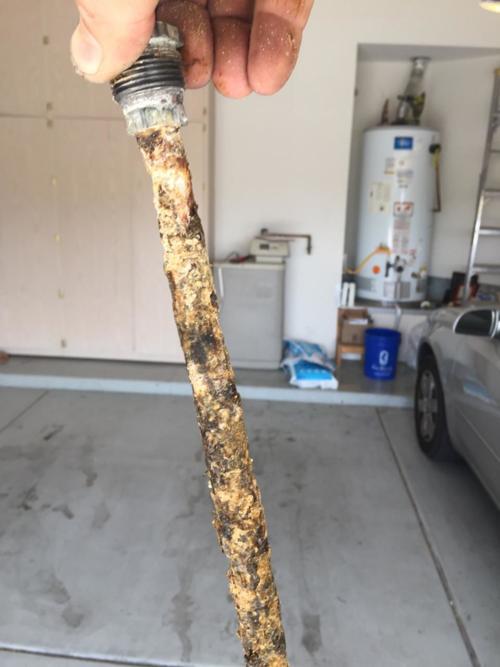Question: The water in my house does not get as hot as it used to, even if I crank the handle as far as it will go. Why am I not getting really hot water?
Answer: It is normal for water heaters to become less efficient as they age. Their average life span is 10 to 12 years. Water temperature that fluctuates may be an early indicator that something is wrong. Mineral deposits may have built up around the heating elements.
If you have a two-element water heater and one of the elements goes bad, the second element is now doing the job of two pieces of equipment.
That second element is having a hard time getting to the hot temperature someone used earlier in the day. You may get hot water if you are the first to use it. Check the condition of the elements. Drain tank to flush the sediments out.
A misnomer is that many issues can be fixed by replacing a corroded anode rod. That’s not true. An anode rod is a steel core wire encased with aluminum, magnesium, or zinc. It is attached to the inside of the water heater to prevent the heater’s lining from corroding.
Over time the anode rod gets smaller, as it is supposed to do because it is keeping minerals out of the water. The anode rod should be replaced when the steel core inside reaches the thickness of a pencil.
Q: When will I know when it is time to replace my water heater or just repair it?
A: A sure sign of needing to replace your water heater is when you come home to an inch of standing water in the garage or laundry room.
But, before you need to head to higher ground, there are a few hints that your water heater just needs repair or is on its way out.
Repair
- Low water pressure: Mineral deposits may have built up on the water heater pipes, which would reduce water pressure. The fix could be as simple as flushing the minerals out of the tank.
- Unusual sounds: A little hissing is perfectly normal. Loud popping or banging sounds likely means that mineral deposits have caused the water heater to overheat in order to keep the water hot.
- Fluctuating water heater: Water temperature that fluctuates may be an early indicator that something is wrong. Mineral deposits may have built up around your heating elements. Again, flush the tank to rid it of mineral deposits. Check heating elements.
Replace
- Leakage: Leakage is the first sign that your water heater is on the fritz and under-performing. Don’t wait for the flood, which may cause damage to your floors, furniture, cabinetry and walls and create mold if not dealt with right away. You will end up replacing much more than the heater.
- Insufficient hot water supply: It is normal for water heaters to become less efficient as they age. However, if you notice that your hot water heater is not able to produce the same amount of hot water it once did, it is time to consider your replacement options.
- High energy costs: Heating water is one of the home’s largest energy expenses. Once a water heater is about 10 years old, its operating efficiency can diminish by 50%. Pay attention to your gas or electric bills for key indicators. If they have been creeping up as the unit ages, it’s time to replace. It will cost less in the long run.
Q: I need to replace my water heater. I have heard about tankless systems. How do they work and what are the benefits?
A: Tankless water heaters are also known as instantaneous, continuous flow, inline, flash, on-demand, or instant-on water. No longer will you have a big tank full of water to keep warm when nobody’s home because they don’t store gallons of heated water for future use. The tankless water heater simply turns on a heat exchanger or heating coils as soon as it detects water when the water is turned on. It only takes five seconds for the tankless water heater to heat up water. When the faucet closes and the water is no longer detected, the coils automatically turn off.
Conventional tank water heaters can be costly to maintain. Tankless models use about 30% less energy than traditional water heaters. That’s a pretty significant savings. It will also reduce your overall water usage, thus lower your water bill. Tankless water heaters do not take up nearly as much space as a traditional unit. Enjoy more space in your laundry room or garage with a significantly smaller system that is attached to the exterior wall.
Important note: It is universally recommended that a whole-house water treatment system be installed with a tankless water heater. Flash-heating water causes the minerals to build up muchfaster than a conventional system. Without the softener, the tank’s manufacturer will likely not warranty the unit.







